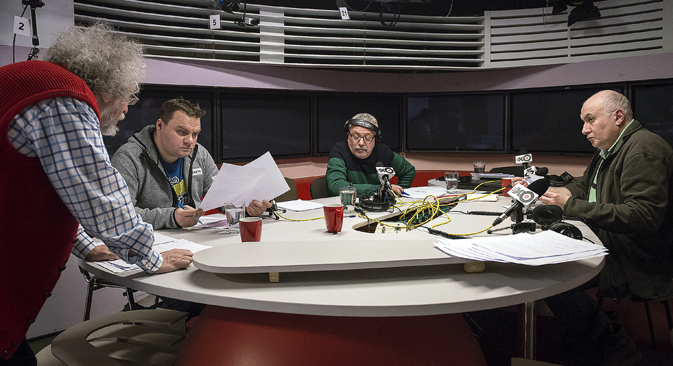
Alexander Plushchev (second from the left) in the Ekho Moskvy studio. Source: TASS
Journalist for independent radio station Ekho Moskvy (Echo of Moscow), Alexander Plushchev has come under fire after posting a provocative remark on his Twitter page about the death of the son of Kremlin Chief of Staff Sergei Ivanov. Alexander Ivanov drowned on Nov. 3 while in the United Arab Emirates.
Mikhail Lesin, chairman of the Board of Directors of the Gazprom-Media holding, the largest media holding in Russia and the radio station’s main shareholder,has issued an order to terminate Plushchev’s employment contract because of an “unethical” statement he made on his personal Twitter account.
On his microblog, the journalist asked readers whether they believed the death of the son of Ivanov’s son Alexander, who in May 2005 controversially escaped conviction after running over and killing 68-year-old pensioner Svetlana Beridze while in his car in a widely-publicized case, to be “proof of the existence of God or a higher power.” Plushchev later removed the tweet and apologized.
Ekho Moskvy stands its ground
The radio station’s editor-in-chief Alexei Venediktov refused to fire the journalist, noting that Ekho Moskvy’s shareholders had not consulted him on the matter, in violation of the station’s charter. In an interview with TV station Dozhd(‘Rain’), Venediktov said, “It is a violation of the media law for the founder to intervene in editorial policy. Alexander Plushchev has to work; otherwise, it’s absenteeism.” According to the editor-in-chief, social networks are a personal space for journalists.
Nonetheless, Ekho Moskvy’s CEO Yekaterina Pavlova issued an order to dismiss Plushchev, and a letter was sent to security guards asking them not to let the journalist enter the building. Gazprom-Media said it would accept Venediktov’s resignation if he refused to agree to fire Plushchev. Plushchev has asked the labor commission to look into the legality of the proceedings.
On Nov. 8, Plushchev went on the air via Skype to deliver his usual program called Odin (‘Alone’).
Roskomnadzor, the federal body responsible for overseeing the media, recently issued a written warning to Ekho Moskvy for a program that aired on Oct. 29 called Svoimi Glazami (‘With Your Own Eyes’), in which the hosts – Plushchev himself and Sofiko Shevardnadze - discussed the fighting between Ukrainian armed forces and pro-autonomy militants at Donetsk Airport with their two guests – Los Angeles Times correspondent Sergei Loiko and Dozhd journalist Timur Olevsky.
According to Roskomnadzor, “there was information in this program that justifies the practice of war crimes.” The regulator did not give examples of which information it considered to be offensive.
A question of ethics?
Experts interviewed by RBTH think this conflict is a good illustration of the issues that arise due to the absence of coherent ethical norms in the Russian journalistic community, as Dean of the Journalism Faculty at Moscow State University Yelena Vartanova explained.
“When conflicts arise in the Russian media, the founders refer to legislation, and the editors refer to the editorial office’s internal charter. But an ethical code that is the product of collective agreement within the journalistic community is necessary to solve the problem without resorting to the strict requirements of the law,” Vartanova told RBTH.
In Vartanova’s opinion, “It’s important to start prescribing in a journalist’s employment contract whether or not social networks are the journalist’s personal space or whether he or she is still a public figure on Facebook or Twitter.”
Journalist, public figure, and popular blogger Anton Nosik does not believe there can be any unified ethical principles in the journalistic community; he thinks behavioral norms should be regulated in the employment contract.
“Echo of Moscow’s shareholders have butted into editorial legal relations, which is prohibited by the media law and the radio station’s charter. It makes no sense to sue over whether or not a journalist’s tweets are ethical or unethical when the founders themselves are breaking the law,” says Nosik.
Yelena Sherstoboyeva, a research fellow at the Faculty of Communications, Media, and Design at the Higher School of Economics, agrees that as public figures, journalists should take more precaution when expressing their personal opinions on social networks.
However, in her opinion, the situation surrounding Plushchev’s dismissal is more a violation of legal than ethical norms: “The media law in Russia clearly states that a founder has no right to interfere in the editorial office’s professional activity,” says Sherstoboyeva, who points out that the law also states that the relations between the founder and editorial office are regulated by the latter’s charter, but not the charter of the company that owns the media.
“These charters are often confused,” she continues. “If Ekho Moskvy’s charter states that a journalist is fired at the editor-in-chief’s suggestion, that means the norm is protected by law. Failure to comply with the editorial office’s charter is considered a violation incurring liability, up to the criminal level.”
All rights reserved by Rossiyskaya Gazeta.
Subscribe
to our newsletter!
Get the week's best stories straight to your inbox